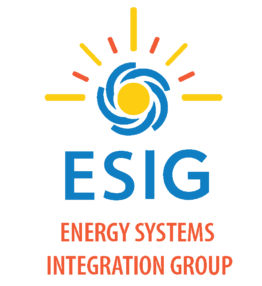
- This event has passed.
Webinar: Towards a Common Understanding of Energy System Costs
May 25, 2021 @ 4:00 pm - 6:00 pm CEST

Date: Tuesday, May 25, 2021 – 4:00 pm (Central European Time), 10:00 am (Eastern US Time)
The EERA Joint Program on Energy Systems Integration together with ESIG, is organizing a workshop program on the issue of “System Integration Costs”. In the last decade, a diversity of publications, reports and approaches have been presented on this matter, with sometimes seemingly different interpretations. This webinar is part of a four-step program on this matter (including also an in-person workshop in fall 2021 in Leuven, Belgium, and the writing of a consensus paper). Through this program, we will strive for a common understanding and consensus of this concept.
Featured Speakers & Presentations:
The Hirth & Ueckerdt Philosophy of System Value and System Cost
Lion Hirth (Neon Energy & Hertie School, Berlin, DE) & Falko Ueckerdt (Potsdam Institute, DE)
The Milligan School on Cost Causation
Juha Kiviluoma (VTT, FI)
The NEA Approach Confronting VRE with Nuclear
Marco Cometto (formerly OECD/NEA, now IAEA, Vienna, AT) & Jan Horst Keppler (OECD/NEA & Univ Dauphine, Paris, FR)
The System Cost Detailed Simulation Approach
Goran Strbac (Imperial College, London, UK)
Moderators: William D’haeseleer (KU Leuven, BE) and Erik Delarue (KU Leuven, BE)
Registration Cost: FREE
Q&A Session: No Q&A, nor discussion will take place at this point, but an electronic question drop-off box will be available. The submitted questions will be taken up in the further steps of the program. We will be using the slido platform for this question drop-off. Please submit your questions and at this link. Presentations are recorded and remain available online afterwards.
About the Speakers:
Lion Hirth is founder and director of Neon, a boutique energy economics consulting firm; assistant professor at Hertie School, a Berlin-based public policy school. He is an energy economist and expert in renewable energy and electricity market design. He has advised numerous clients on system integration costs and has published a series of articles on that matter.
Falko Ueckerdt is a senior scientist at the Potsdam Institute for Climate Impact Research (PIK). There he leads a team on National Energy Transitions. He has been the main developer of the system LCOE metric, but is currently more engaged in researching hydrogen and electrification.
Juha Kiviluoma is a principal scientist at the VTT Technical Research Centre of Finland and a part-time senior energy systems researcher at the University College Dublin. He has a wide-ranging interest in electrification of energy, flexibility, energy system planning and operation as well as in tool and method development.
Marco Cometto is an energy economist at the International Atomic Energy Agency of the United Nations, where he works on the economics of nuclear power. The main areas of his research are the integration of nuclear and renewable energy and the analysis of costs and financing options for nuclear projects.
Jan Horst Keppler is Senior Economic Advisor at the OECD Nuclear Energy Agency. He pursues the system cost analysis of integrated electricity systems in order to assist policymakers in identifying low carbon generation mixes that allow to attain ambitions carbon emission reduction targets while maintaining high levels of security of supply at least economic cost. He is also professor of economics at Université Paris Dauphine-PSL.
Goran Strbac is a Professor of Energy Systems at Imperial College London – he led the development of advanced whole-system methodologies that have been extensively used to inform industry, governments and regulatory bodies about the role and value of emerging new technologies and systems in supporting cost effective evolution to smart and resilient low carbon energy future.

Lion Hirth

Falko Ueckerdt

Juha Kiviluoma

Marco Cometto

Jan Horst Keppler

Goran Strbac
About the Moderators:
William D’haeseleer is professor in Energy Systems at the University of Leuven (KU Leuven), Belgium, director of its Energy Institute and academic member of EnergyVille. His current research concentrates on energy systems and energy policy, with emphasis on interdisciplinary aspects, particularly energy-system integration & interactions, including flexibility & sector coupling, system effects related to hydrogen, power to gas and e-fuels.
Erik Delarue is assistant professor in Energy Systems at the University of Leuven (KU Leuven), Belgium, and active in EnergyVille. His research and expertise is on quantitative tools, supporting an efficient operation of, and transition towards, a low-carbon energy system (mathematical modeling of energy systems), with a strong interdisciplinary focus (techno-economic models, linked to energy markets and policies).

William D’haeseleer

Erik Delarue

